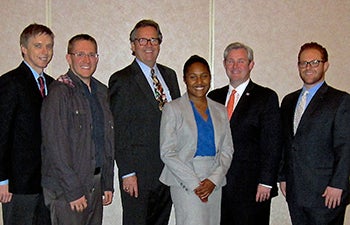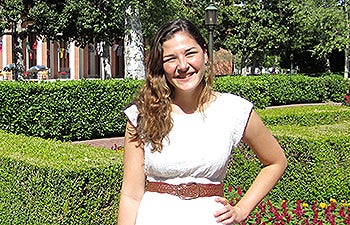Networking with Economists
USC Dornsife political economy sophomore Ali DeGuide came to a recent panel event hosted by the USC Dornsife Department of Economics dressed professionally and armed with constructive curiosity.
Held at the Radisson Hotel across from USC, the event included a panel comprised of economics alumni professionals. After discussing their experiences, panelists asked the audience of mostly students for questions.
After an awkward silence, DeGuide confidently raised her hand and stood.
“I imagine myself as an economics analyst on T.V., but that probably isn’t realistic, is it?” she asked the panelists, members of USC Dornsife’s Economics Leadership Council (ELC), formally launched in 2013.
That would not be an easy route, the panelists acknowledged, but they believed that DeGuide would realize her dream. Why? Because she had the nerve to stand up and ask her question when others were hesitant.
“Never give up on that ambition,” said panelist Bradford Hughes, a partner at Selman Breitman LLP, who earned his bachelor’s in 2003. “You may be among the chosen few who actually make it on T.V.”
The March 25 panel discussion was one of the many ways the Department of Economics reaches out to undergraduates and graduate students to offer networking opportunities and guidance about how to use the skills they learn in the classroom to secure and succeed in jobs post-graduation.

Mark Moore, director of undergraduate studies for the economics department (left), and senior Ryan Barner (fourth from left) with Economics Leadership Council members (left to right) Scott Sternberg, John Flynn, Bradford Hughes and Paul Tennen. Photo by Lizzie Hedrick.
Mark Moore, director of undergraduate studies for the economics department, devised the idea for these new programs — and welcomed the support of the ELC in implementing them.
In addition, this Spring, the department began offering the course “Career Development for the Trained Economist” for sophomores and juniors. The course is under the auspices of USC Dornsife’s Second-Year Inquiry (SYI) program, launched in 2013, which gives guidance and opportunities to middle-classmen. Economics alumni have visited the career development class to give students insight on how to succeed.
Paul Tennen, president of Linder and Associates, a real estate property management firm, participated in the March panel and spoke to students in the career development class.
“After class, a student came up to for advice,” Tennen said. “He said he had applied for internships at all the major consulting firms and hadn’t heard back. He asked me what he was doing wrong. I told him to start small; apply to some of the local firms — that they would love to have an intern. This was a new way of thinking for him.”
Another initiative this semester has been a series of nine alumni mentorship luncheons on campus. These gatherings give students the opportunity to speak informally with alumni such as Rodney Swan — an entrepreneur who graduated from the Economics Honors Program with bachelor’s and master’s degrees in 1989. He now owns agriculture, real estate development and construction companies.
“Each of the students who attended wanted to do something different,” Swan recalled. “One wanted to go into public-policy, advising congressmen and senators; another wanted to be an entrepreneur; one wanted to go into law. I advised them to use their analytical and critical thinking skills from their economics education to shape their lives and careers.”
In mid-April, during another networking luncheon, junior Jake Roberts commented about why he majored in in economics. “It makes one very polymathic,” he said. “You get to look at the economy through the lens of history, politics, philosophy, ethics and so many other subjects. I would rather garner a range of knowledge and make connections now — then specialize later.”

Sophomore Ali DeGuide is a political economy major whose dream is to be an economic analyst on television. Photo courtesy of Ali DeGuide.
The Economics Leadership Council has about 20 members. The council meets regularly to brainstorm ways to best mentor students on career-targeted life skills they will need to succeed professionally.
“Now that I’ve been out of school for a while, I have a completely different perspective on how to best assess yourself and how to improve your chances of getting a job after graduation,” said Scott Sternberg, president of the USC Alumni Chapter of Los Angeles, who earned his bachelor’s degree in 2007. Sternberg is a litigation consultant who helps lawyers better understand math and economics for their cases.
Ryan Barner, a senior who is co-president of Omicron Delta Epsilon, USC’s chapter of the International Economics Honors Society, said she has benefited immensely from the opportunities to interact with alumni.
“I am an economics major, but I picked up a minor in business law because I saw that the USC Marshall School of Business offered mentorship and networking programs,” said Barner, who has already been offered a consulting job with Oracle Corporation for next year. “So I was very excited to see that the economics department was offering networking luncheons with alumni. It shows that the department cares about how we do after graduation. Having strong alumni connections offers me a sense of reassurance — a safety net.
“The informal luncheons have been great because they offer the opportunity to ask more personal questions,” she said. “You can ask questions about things like work and family life, and how to balance your career with other interests. These are important things that are not taught in class.”